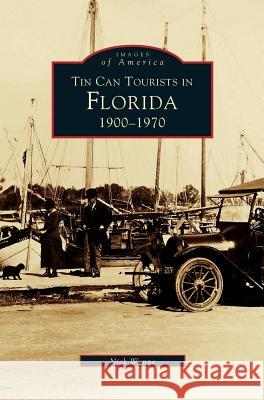Tin Can Tourists in Florida 1900-1970 » książka
Tin Can Tourists in Florida 1900-1970
ISBN-13: 9781531601409 / Angielski / Twarda / 1999 / 130 str.
With the arrival of the twentieth century, Americans continued in the pioneering spirit of their forebears and looked upon the automobile as a new way to explore the unknown. Thousands of Americans packed their tents in the backs of their cars and set out to enjoy the back roads of the United States. Carrying extra gasoline in five-gallon cans, plenty of canned food, and extra tires strapped to the fenders, these intrepid souls began an exploration of the North American continent with a thoroughness that put Lewis and Clark to shame. These tourists became the symbol of another "New Generation" of Americans, restless, adventuresome, and filled with boundless curiosity. These were the "Tin Can" tourists.
In 1919, the official organization of Tin Can Tourists of the World was formed in Tampa, and the group held two meetings annually until disbanding in 1977. Early on, residents of Florida recognized the potential economic impact of the Tin Canners on the state, and the movement to improve roads and provide accommodations and amusements to these seasonal travelers flourished. By 1930, Florida had built more than 3,000 miles of paved roads, and campsites, roadside motels, and exotic animal parks could be found along most major thoroughfares.
With the arrival of the twentieth century, Americans continued in the pioneering spirit of their forebears and looked upon the automobile as a new way to explore the unknown. Thousands of Americans packed their tents in the backs of their cars and set out to enjoy the back roads of the United States. Carrying extra gasoline in five-gallon cans, plenty of canned food, and extra tires strapped to the fenders, these intrepid souls began an exploration of the North American continent with a thoroughness that put Lewis and Clark to shame. These tourists became the symbol of another "New Generation" of Americans, restless, adventuresome, and filled with boundless curiosity. These were the "Tin Can" tourists.
In 1919, the official organization of Tin Can Tourists of the World was formed in Tampa, and the group held two meetings annually until disbanding in 1977. Early on, residents of Florida recognized the potential economic impact of the Tin Canners on the state, and the movement to improve roads and provide accommodations and amusements to these seasonal travelers flourished. By 1930, Florida had built more than 3,000 miles of paved roads, and campsites, roadside motels, and exotic animal parks could be found along most major thoroughfares.











